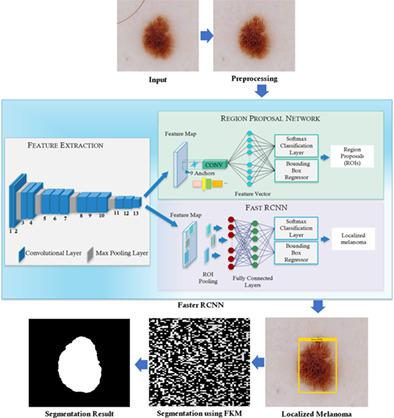当前位置:
X-MOL 学术
›
Microsc. Res. Tech.
›
论文详情
Our official English website, www.x-mol.net, welcomes your
feedback! (Note: you will need to create a separate account there.)
Skin cancer detection from dermoscopic images using deep learning and fuzzy k-means clustering
Microscopy Research and Technique ( IF 2.0 ) Pub Date : 2021-08-27 , DOI: 10.1002/jemt.23908 Marriam Nawaz 1 , Zahid Mehmood 2 , Tahira Nazir 1 , Rizwan Ali Naqvi 3 , Amjad Rehman 4 , Munwar Iqbal 2 , Tanzila Saba 4
Microscopy Research and Technique ( IF 2.0 ) Pub Date : 2021-08-27 , DOI: 10.1002/jemt.23908 Marriam Nawaz 1 , Zahid Mehmood 2 , Tahira Nazir 1 , Rizwan Ali Naqvi 3 , Amjad Rehman 4 , Munwar Iqbal 2 , Tanzila Saba 4
Affiliation

|
Melanoma skin cancer is the most life-threatening and fatal disease among the family of skin cancer diseases. Modern technological developments and research methodologies made it possible to detect and identify this kind of skin cancer more effectively; however, the automated localization and segmentation of skin lesion at earlier stages is still a challenging task due to the low contrast between melanoma moles and skin portion and a higher level of color similarity between melanoma-affected and -nonaffected areas. In this paper, we present a fully automated method for segmenting the skin melanoma at its earliest stage by employing a deep-learning-based approach, namely faster region-based convolutional neural networks (RCNN) along with fuzzy k-means clustering (FKM). Several clinical images are utilized to test the presented method so that it may help the dermatologist in diagnosing this life-threatening disease at its earliest stage. The presented method first preprocesses the dataset images to remove the noise and illumination problems and enhance the visual information before applying the faster-RCNN to obtain the feature vector of fixed length. After that, FKM has been employed to segment the melanoma-affected portion of skin with variable size and boundaries. The performance of the presented method is evaluated on the three standard datasets, namely ISBI-2016, ISIC-2017, and PH2, and the results show that the presented method outperforms the state-of-the-art approaches. The presented method attains an average accuracy of 95.40, 93.1, and 95.6% on the ISIC-2016, ISIC-2017, and PH2 datasets, respectively, which is showing its robustness to skin lesion recognition and segmentation.
中文翻译:

使用深度学习和模糊 k 均值聚类从皮肤镜图像中检测皮肤癌
黑色素瘤皮肤癌是皮肤癌疾病家族中最危及生命和致命的疾病。现代技术发展和研究方法使更有效地检测和识别这种皮肤癌成为可能;然而,由于黑色素瘤痣和皮肤部分之间的对比度低,以及黑色素瘤受影响区域和未受影响区域之间的颜色相似度较高,因此早期皮肤病变的自动定位和分割仍然是一项具有挑战性的任务。在本文中,我们提出了一种全自动方法,通过采用基于深度学习的方法,即更快的基于区域的卷积神经网络 (RCNN) 以及模糊k- 表示聚类(FKM)。几个临床图像被用来测试所提出的方法,以便它可以帮助皮肤科医生在最早阶段诊断这种危及生命的疾病。所提出的方法首先对数据集图像进行预处理以去除噪声和光照问题并增强视觉信息,然后再应用 fast-RCNN 获得固定长度的特征向量。之后,FKM 已被用于以可变的大小和边界分割受黑色素瘤影响的皮肤部分。在三个标准数据集,即 ISBI-2016、ISIC-2017 和 PH2 上评估了所提出方法的性能,结果表明所提出的方法优于最先进的方法。所提出的方法在 ISIC-2016、ISIC-2017、
更新日期:2021-08-27
中文翻译:

使用深度学习和模糊 k 均值聚类从皮肤镜图像中检测皮肤癌
黑色素瘤皮肤癌是皮肤癌疾病家族中最危及生命和致命的疾病。现代技术发展和研究方法使更有效地检测和识别这种皮肤癌成为可能;然而,由于黑色素瘤痣和皮肤部分之间的对比度低,以及黑色素瘤受影响区域和未受影响区域之间的颜色相似度较高,因此早期皮肤病变的自动定位和分割仍然是一项具有挑战性的任务。在本文中,我们提出了一种全自动方法,通过采用基于深度学习的方法,即更快的基于区域的卷积神经网络 (RCNN) 以及模糊k- 表示聚类(FKM)。几个临床图像被用来测试所提出的方法,以便它可以帮助皮肤科医生在最早阶段诊断这种危及生命的疾病。所提出的方法首先对数据集图像进行预处理以去除噪声和光照问题并增强视觉信息,然后再应用 fast-RCNN 获得固定长度的特征向量。之后,FKM 已被用于以可变的大小和边界分割受黑色素瘤影响的皮肤部分。在三个标准数据集,即 ISBI-2016、ISIC-2017 和 PH2 上评估了所提出方法的性能,结果表明所提出的方法优于最先进的方法。所提出的方法在 ISIC-2016、ISIC-2017、









































 京公网安备 11010802027423号
京公网安备 11010802027423号